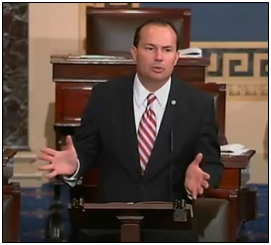
Writing for the Deseret News, Lee said, “I am going to offer an amendment that simply requires Congress to pay for that $141 billion under its normal ‘Pay As You Go’ budget rules.”
What that would mean is, to pay for the doc fix, this Congress would have until the end of the year to find the savings to offset the bill’s cost. If the alternative cuts were not found and passed, then a sequester would cut about $15 billion from mandatory spending not exempt from the “pay as you go” rules each year through 2025.
This is a true test for the Senate majority under Republican leadership. Can they find a way to pay for eliminating the sustainable growth rate in Medicare? As Lee noted in his op-ed, the government agencies would barely miss the money, since it would mean less than a 1 percent cut to total spending.
That is the least taxpayers can expect, especially since Congress is now seeing fit to eliminate the centerpiece of the Balanced Budget Act of 1997 — which was supposed to save the program from insolvency. That year, the Medicare trustees were predicting that the Hospital Insurance Trust Fund would be exhausted by 2001. Controlling the growth of Medicare spending was an issue that resulted in two government shutdowns in late 1995 and early 1996.
But none of that matters any more. Congress wants to increase Medicare spending.
The Congressional Budget Office reports that the legislation, which increases payments to doctors and reauthorizes the Children’s Health Insurance Program through fiscal year 2017, will add $141 billion to the deficit over the next 10 years not counting interest, which could add another $30 billion. In the second 10 years, the Committee for a Responsible Federal Budget estimates that the legislation could add another $325 billion or so to the debt by 2035.
That cannot be good for the long-term health of the program.
In 2014, the trust fund was said to be exhausted in 2030. Under the bill, a word of caution has come from the Centers for Medicare and Medicaid Services (CMS) that, although “under the provisions of H.R. 2, the fund would be depleted one year later, in 2031,” this is primarily because “additional updates totaling $500 million per year and a 5 percent annual bonus are scheduled to expire in 2025, resulting in a payment reduction for most physicians.”
Meaning the CMS budget score is misleading, since the supposed trust fund savings in the program come about only because some of the increased physician payments are set to expire in 2025, which everyone knows Congress will just sidestep when the rubber meets the road. Sound familiar?
Also, assuming that the new physician payment reductions will not be overridden breaks with current practice by the program’s trustees, who currently assume that sustainable growth rate reductions will be overridden by Congress. The trustees said as much in the 2014 trustees report: “This year’s report (and this Summary) gives primary emphasis to the projected baseline, in which it is assumed that sustainable growth rate reductions are overridden by Congress, as has occurred in every year since 2003.”
Meaning, if H.R. 2 were analyzed by CMS the same way the trustees look at the sustainable growth rate — where they assume physician payment reductions are overridden by Congress — then they would likely find the trust fund will now be exhausted prior to 2030, instead of after.
Leaving aside whether this was done intentionally, to avoid a negative assessment from the agency on the trust fund depletion date, Congress is simply creating the need for another doc fix come 2025. That is when the trust fund will really feel the pain of H.R. 2.
That is, if members cannot find a way to pay for it now by cutting spending elsewhere per Senator Lee’s amendment.
Is that so hard? Can Congress pay for blowing a $141 billion hole in the budget? When Lee’s amendment comes up in the Senate this week, we will find out.
Robert Romano is the senior editor of Americans for Limited Government.







